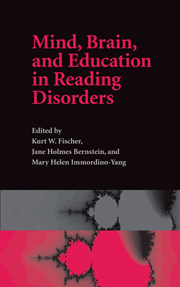Book contents
- Frontmatter
- Contents
- List of figures
- List of tables
- List of contributors
- Acknowledgements
- Part I What is Reading, and What are Reading Disorders? Looking to Neuroscience, Evolution, and Genetics
- 1 Toward a grounded synthesis of mind, brain, and education for reading disorders: an introduction to the field and this book
- 2 An evolutionary perspective on reading and reading disorders
- Essay: Brain volume and the acquisition of adaptive capacities
- 3 The genetics of dyslexia: what is the phenotype?
- Part II Reading and the Growing Brain: Methodology and History
- Part III Watching Children Read
- Part IV Reading Skills in the Long Term
- Appendix: Transcript and behavioral data from Profiles in Reading Skills (Four Boys)
- Index
- References
1 - Toward a grounded synthesis of mind, brain, and education for reading disorders: an introduction to the field and this book
Published online by Cambridge University Press: 22 September 2009
- Frontmatter
- Contents
- List of figures
- List of tables
- List of contributors
- Acknowledgements
- Part I What is Reading, and What are Reading Disorders? Looking to Neuroscience, Evolution, and Genetics
- 1 Toward a grounded synthesis of mind, brain, and education for reading disorders: an introduction to the field and this book
- 2 An evolutionary perspective on reading and reading disorders
- Essay: Brain volume and the acquisition of adaptive capacities
- 3 The genetics of dyslexia: what is the phenotype?
- Part II Reading and the Growing Brain: Methodology and History
- Part III Watching Children Read
- Part IV Reading Skills in the Long Term
- Appendix: Transcript and behavioral data from Profiles in Reading Skills (Four Boys)
- Index
- References
Summary
This is a new era in the fields of education, neuroscience, and cognitive science – a time to bring together mind, brain, and education. The advent of powerful new in vivo brain imaging technologies, the power of the burgeoning discoveries in genetics, and the general excitement in society about biology make possible a new alliance relating biology, cognition, and education (Educational Leadership, 1998). Hidden brain and genetic processes are becoming increasingly visible (Gage, 2003; Lyon & Rumsey, 1996; Thatcher, Lyon, Rumsey, & Krasnegor, 1996), and in a few tantalizing cases, researchers and educators can even begin to observe the functional neuropsychological effects of educational interventions. It is an exciting time! This book is designed to promote the dialogue that is essential to creating the best integration of biology, cognitive science, and education.
The burgeoning new knowledge and the focus of society on biology lead to expectations that sometimes upset the balance between scientific knowledge and meaningful use in practice, raising numerous new ethical and educational issues (Battro, 2000; Bruer, 1997, 1999; Scientific American, 2003). The best research and the best educational practice require a two-way interaction between the scientific research and the knowledge of educators working to help children learn. Research in neuroscience and genetics, for instance, gains new significance and controversy as educators and clinicians work to translate it into practice, dealing with the strengths and weaknesses of real children learning in schools. This translation to practice should, in turn, filter back down to shape new scientific questions.
- Type
- Chapter
- Information
- Mind, Brain, and Education in Reading Disorders , pp. 3 - 15Publisher: Cambridge University PressPrint publication year: 2007
References
- 9
- Cited by

